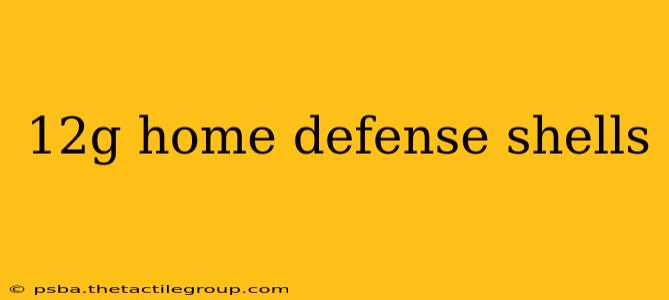Choosing the right ammunition for home defense is a critical decision, impacting the safety of your family and your legal standing in the event of a self-defense situation. This guide focuses specifically on 12 gauge home defense shells, exploring various options and helping you make an informed choice. We'll delve into different shot types, projectile weights, and crucial considerations to ensure you're prepared for any unforeseen circumstance. This information is for educational purposes only and should not be considered legal advice. Always check your local laws and regulations before purchasing and using any firearm or ammunition.
Understanding the Importance of Ammunition Selection
The effectiveness of your home defense shotgun hinges heavily on the ammunition you choose. A poorly selected round can overpenetrate, posing a risk to innocent bystanders, or underperform, leaving you vulnerable. The ideal home defense round needs to offer:
- Optimal Stopping Power: The ability to immediately incapacitate a threat.
- Reduced Overpenetration: Minimizing the risk of rounds passing through walls and injuring others.
- Reliable Function: Consistent performance in your specific shotgun.
12 Gauge Home Defense Shell Options: A Detailed Look
Several types of 12 gauge shells cater specifically to home defense scenarios:
1. Buckshot
Buckshot shells contain multiple lead or other metal pellets, offering a wide spread pattern at close range. Common buckshot sizes include:
- 00 Buck: The most popular choice for home defense, offering a balance between stopping power and reduced overpenetration compared to larger sizes. Nine .33 caliber pellets provide substantial stopping power.
- #1 Buck: Smaller pellets than 00 buck, offering a tighter pattern and potentially less overpenetration, but with slightly reduced stopping power.
- #4 Buck: Even smaller pellets, ideal for situations where overpenetration is a major concern, but with significantly less stopping power than 00 or #1 buck.
Choosing the right buckshot size is a crucial balancing act. 00 buck is a good all-around option for its effectiveness and manageable recoil, but consider #1 or #4 buck if you are concerned about excessive overpenetration in your particular living space.
2. Slugs
Slugs are single projectiles, designed for longer-range accuracy and greater penetration. While effective at longer distances, slugs are generally not recommended for home defense due to their higher risk of overpenetration, which can easily cause harm to innocent bystanders beyond the immediate target area.
3. Reduced-Recoil Loads
The powerful recoil of a 12 gauge shotgun can be a concern, especially for less experienced users. Reduced-recoil loads use lighter shot charges or specialized propellant to lessen the felt recoil, improving control and follow-up shots.
Factors to Consider When Choosing Ammunition
Beyond shot type, consider these critical factors:
- Your Shotgun: Different shotguns perform differently with varying ammunition types. Always test your specific shotgun with different 12 gauge home defense shells to ensure reliable functioning.
- Your Living Space: The layout of your home significantly impacts the risk of overpenetration. Densely packed homes may benefit from smaller shot sizes like #1 or #4 buck.
- Your Training: Proper training and proficiency with your shotgun are paramount. No matter the ammunition chosen, accurate shot placement is essential for effective home defense.
Conclusion: Making the Right Choice
Selecting the right 12 gauge home defense shells requires careful consideration of various factors. While 00 buckshot often emerges as the preferred choice for its balance of stopping power and manageable overpenetration, individual needs and circumstances dictate the best option. Always prioritize safety and responsible firearm ownership, and remember to thoroughly research and practice with your chosen ammunition before relying on it in a self-defense situation. Consult with firearms experts and undergo professional training to ensure you are properly prepared and equipped to handle any potential threat.

